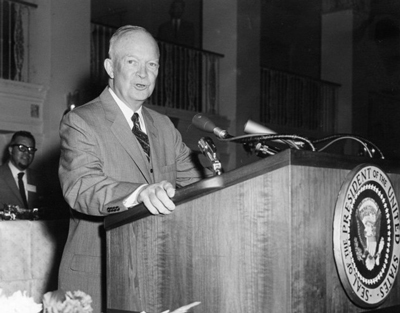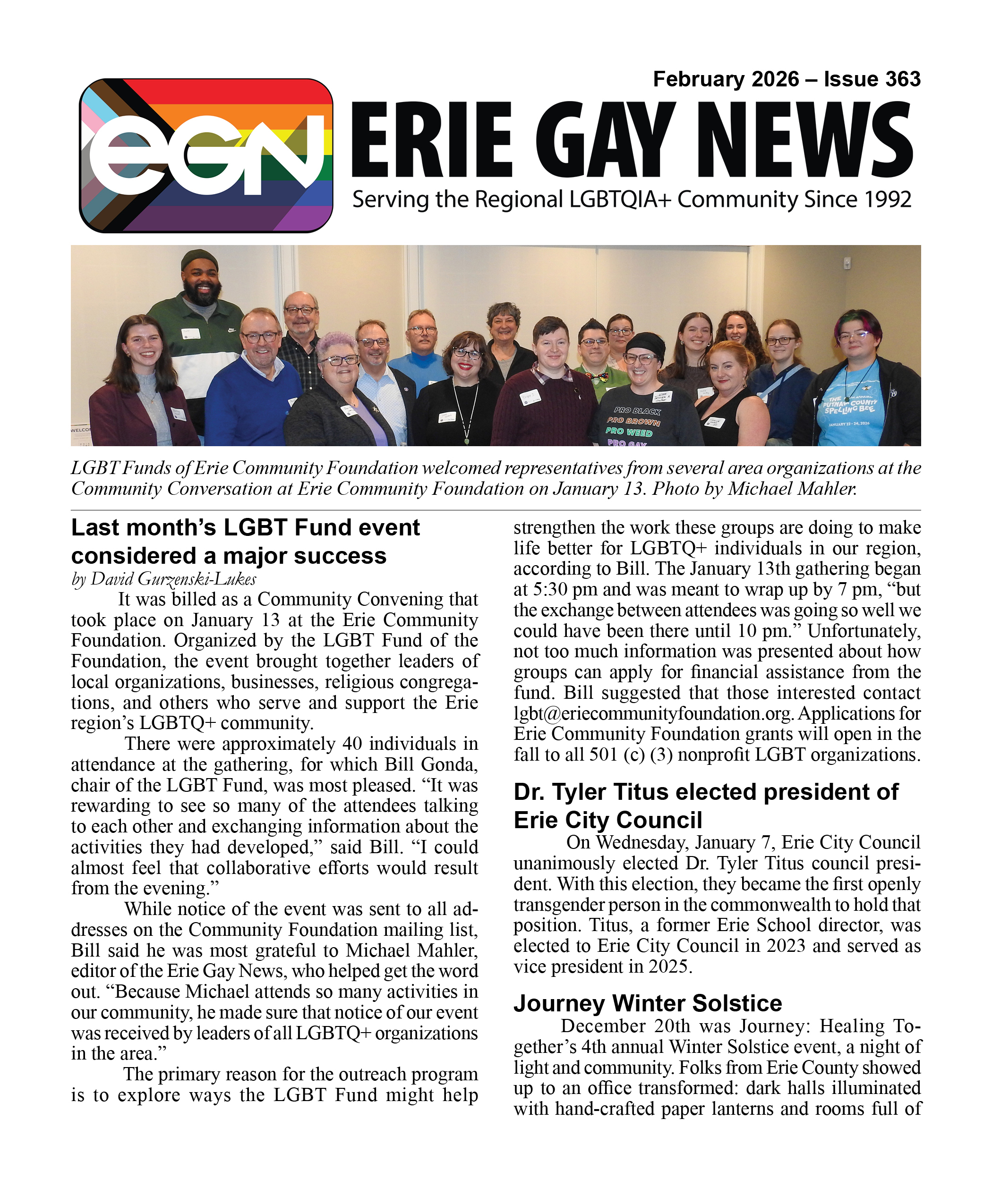The Lavender Scare: The Case Against Homosexuals
by Victoria A. Brownworth

President Dwight D. Eisenhower delivering a speech sponsored by the National Newspaper Publishers Association in 1958. (Photo: The U.S. National Archives)
There is perhaps no more critical election in U.S. history than the one in which Americans vote Nov. 5. Vice President Kamala Harris has said repeatedly as she campaigns that former president Donald Trump poses a threat to democracy as well as to a myriad of aspects of Americans' daily lives. The specter of Jan. 6, 2021 remains vivid for most Americans, so it's not a hyperbolic statement or mere electioneering.
In addition, Harris has cited the Heritage Foundation's Project 2025, which is a plan to remake the American government. It will also deeply threaten historically marginalized communities, notably immigrants and LGBTQ+ people.
While Trump claims to know nothing about Project 2025, members of his former administration were among its authors and architects. Harris has it up on her website, so voters can see what Project 2025 would do, and she referenced it in the Sept. 10 debate.
Yet since the debate, Americans have also witnessed first hand the impact rumor and innuendo an important element in the Project 2025 playbookcan have on whole communities after Trump asserted that Haitian immigrants in Ohio are kidnapping pets and eating them. That false claim, debunked in real-time in the debate by ABC moderator David Muir and many times since by various Ohio officials including law enforcement and even the Republican governor, has shown the nation how a fast-moving rumor can impact both a small community like Springfield, Ohio and take over an entire country.
HUAC hearings, the Red Scare and homosexuals
That's what happened when the Red Scarethe threat of Communists infiltrating American society at every level in the 1940s and 1950sgave birth to the Lavender Scare: a belief that homosexual (a term that was used to describe the community at the time) men and women were seen as "sexual perverts," "deviants" and a national security threat. As Trump and his running mate, Ohio senator JD Vance, have made false accusations against Haitian immigrants, most Republicans in both the House and Senate have supported these rumors. This is similar to how Wisconsin Republican Sen. Joseph McCarthy spread rumors about Communists in the U.S. government decades ago.
Many of McCarthy's fellow Republicans at that timeincluding President Dwight D. Eisenhowersupported McCarthy's dogged work to weed out Communists in American society, but it was also a bipartisan effort with some Democrats supporting McCarthy as well. Democrats were also actively engaged in the homosexual purges that led to the Lavender Scare in which McCarthy claimed that homosexuals were more vulnerable to blackmail from the Soviets, and were therefore a national security risk and posed a significant threat to the country as the Cold War ratcheted up.
In 1947, the U.S. Park Police started their "Sex Perversion Elimination Program," which targeted gay men for arrest and intimidation. In 1948, Congress passed an act "for the treatment of sexual psychopaths" in the nation's capital. That law facilitated the arrest and punishment of people who acted on same-sex desire and also labeled them mentally ill.
The subversive aspects of both homosexuality and Communism began to be linked. In 1950, even the Communist Party had issued a warning about the threat of homosexuality.
McCarthy's efforts to eradicate Communists and his focus on homosexuals in particular brought a significant number of closeted writers, actors and even politicians before his House Un-American Activities Committee (HUAC) hearings. Ironically, his main support for his work was his assistant, 26-year-old Roy Cohn, a closeted gay man who would later become Donald Trump's attorney.
Executive Order 10450 fuels Lavender Scare
The direct connection between McCarthy and HUAC to Eisenhower's Executive Order 10450, issued on April 27, 1953, which led to the expulsion of homosexuals from all levels of American government, remains unclear, but a link certainly existed. The policy was succinct and unforgiving: Anyone suspected of being a lesbian or gay man was summarily dismissed from their positions, no matter what the placement. There were no protections for these men and women from the reveal about their sexual orientation, either.
The devastating impact of that policy reverberated for years and touched thousands of gay men and lesbians. Executive Order 10450 was not rescinded until 1995 and continued to bar gays from entering the military until the establishment of "Don't Ask, Don't Tell," which in turn was not repealed until 2011.
Eisenhower precedes Project 2025
Eisenhower's acceptance of McCarthy's actions and McCarthyism itself has been minimized, yet it was only two months after issuing that Executive Order that Julius and Ethel Rosenberg were executed by the federal government on June 19, 1953 at Sing Sing Prison in Ossining, New York. The Rosenbergs were the first American civilians to be executed for espionage and the first to be executed during peacetime and Eisenhower did not stop their execution.
Eisenhower is often called the last good Republican president and a serious conservative who put country first over party. Yet Eisenhower's history is quite different and he succumbed to the worst aspects of bigotry and propagated two of the worst policies in modern U.S. history: his Executive Order 10450 and Operation Wetbackeven referencing the latter by name can get you a timeout on Twitter/X for using an ethnic slur.
Executive Order 10450 removed homosexuals from every arena of American government from 1953 until well into the 1970s. The HUAC and Lavender Scare impact was extraordinaryand largely hidden. In his 2020 book, "The Deviant's War: The Homosexual vs. the United States of America," Eric Cervini reports the prosecution of around one million gay or lesbian individuals in the U.S. from 1945 to 1960 and that by the end of the 1940s, Washington officials announced the "Sex Perversion Elimination Program."
Eisenhower's "Operation Wetback" removed Mexican immigrants, including American citizens, from the U.S. Millions of Mexicans had legally entered the country through joint immigration programs in the first half of the 20th century. Many of these immigrants were then naturalized citizens. Operation Wetback sent them back to Mexicoin much the way Trump asserts he will do with immigrants if he is re-elected. It is also a foundational tenet of Project 2025.
The purge of homosexuals was ongoing
But this assault on homosexuals was not just about McCarthy, nor was it solely the purview of Republicans. The Subcommittee on Investigations was chaired by Democratic Senator Clyde R. Hoey from 1949 to 1952 and investigated "the employment of homosexuals in the Federal workforce." McCarthy embraced this theme in the HUAC hearings as The Hoey Report stated that all of the government's intelligence agencies "are in complete agreement that sex perverts in Government constitute security risks."
The head of the Washington D.C Metropolitan Police Department vice squad, Lieutenant Roy Blick had testified that 5,000 homosexuals lived in Washington, D.C., and that around 3,700 were federal employees. This lit a fuse to weed out these men and women from the government.
Examining the Lavender Scare
Eisenhower's association with McCarthy highlights how he was far from a benign leader and was in fact one of the most dangerous for lesbians and gay men both at the time and historically. As renowned activist Harry Hay would later be quoted in the New York Times, "We lived in terror almost every day of our lives." The breadth of impact of the Lavender Scare has not been widely reported, but the 2017 documentary "The Lavender Scare" shows how even after men and women were purged from their government jobs, they were pursued by the policy.
One example is Madeleine Tress, 24, who worked as an economist for the U.S. Department of Commerce when two investigators who called her in worked for the U.S. Civil Service Commission. They told her they had evidence of her lesbianism. She was asked to swear an oath. She asked for an attorney and was told she could not have one. Tress lost her job. Later, as the film details, she also lost her Fulbright award. NPR posted an interview with her in 2023 and the transcript is chilling.
The incidental aspects of Executive Order 10450one young lesbian economist's life being upended and virtually ruinedexemplifies what the confluence of McCarthy and Eisenhower did to gay men and lesbians with the Lavender Scare. But the impact went far beyond job losses. Some people died by suicide after being outed, as the repercussions were so devastating on multiple levels that they couldn't bear the fallout. They were labeled as deviants and ostracized in their respective professions.
Activist response to the Lavender Scare
Frank Kameny was working for the United States Army Map Service as an astronomer when he was fired in 1957 for being homosexual. Kameny tried repeatedly but was unable to find another job in the federal government after that firing due to the Lavender Scare.
The impact that had on Kameny propelled him into becoming one of the most pivotal LGBTQ+ civil rights leaders, devoting his life to the gay-rights movement. Kameny was instrumental in creating the Mattachine Society of Washington in 1960. In 1965, four years before the Stonewall Riots, Kameny picketed the White House on the grounds of gay rights. That same year, Kameny led a picket line for gay rights at Independence Hall on July 4, which included veteran Philadelphia lesbian activist Barbara Gittings.
As the election approaches, this history of what a seemingly benign president and an ideologue of a senator can do to threaten, terrorize and even lead to the deaths of whole groups of marginalized people. It's a lesson worth reviewing and a history that continues to impact LGBTQ+ historypast and present.



